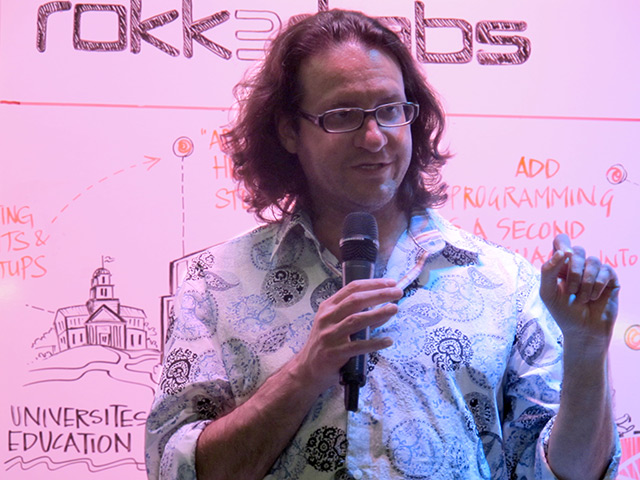
Rokk Miami: Creating a roadmap for Miami startups
Managing director of the Foundry Group, Brad Feld, speaks at Rokk Miami.
More than 300 city leaders, investors and innovators came together at the Light Box in Wynwood yesterday for Rokk Miami, an event designed to help establish Miami as a leading startup community. The event was launched in partnership with Rokk3r Labs and Knight Foundation, along with Brad Feld, an early stage investor and managing director at the Foundry Group.
Feld, renowned author of the book “Startup Communities,” was present at the event to help drive the creation of a roadmap toward reimagining Miami as a hub for innovation and technology. He said he sees a lot of potential in Miami’s already-existing tech ecosystem. Related Link
“Rokk Miami with Brad Feld: No shortage of ideas, next steps for building a startup community” in The Miami Herald
The Value Web, a group that uses onsite artists to map out a “living context” or visual diagrams of collaborative dialogue, also helped facilitate the conversation. The non-linear, innovative brainstorming sessions were thus captured in an unique way, highlighting key themes and connections.
“This is about building together what we cannot do alone,” said Jodi Engelberg, a Value Web ambassador. To facilitate discussions, Engelberg broke participants into eight groups and asked that all personal agendas be “checked at the door.”
Supported by direction from Feld, group discussions challenged leaders to examine eight impact areas. Using these broader topics the group was asked to: prioritize issues and insights, designate a decision-maker responsible for driving solutions and create a timeline for resolution. Here is a taste of some of the subjects and ideas that were discussed:
1. Early stage entrepreneurs
Idea: Create a “Startup Chamber of Commerce,” so that people who are new to the community can get their foot in the door.
Brad Feld (B.F.): It doesn’t matter what stage you are in, there will always be some messiness. It’s important to leave out the overhead for as long as you possibly can. One way that we did this in Boulder, Colo. was to create a “Hitchhikers Guide to the Boulder Tech Startup Community,” a 30-page online slideshare. It’s a one-stop place to point people to and it’s easy to update regularly.
2. Late stage entrepreneurs
Idea: offer mentorship to early stage entrepreneurs
B.F.: I have yet to talk to a late stage entrepreneurs who, in their early days, didn’t have someone supporting them with space, or technology, or offering an investment. Lead the next wave of entrepreneurs. Be that person who invests without expectation.
3. Early stage investors
Idea: Create a hub for innovators, embrace local events and enroll on mapyourstartup today.
B.F.: I define startup geography as a collection of neighborhoods. There are six [surrounding] startup cities that make up Boston. Each has their own unique characteristics, but they are all linked.
4. Late stage investors
Idea: Create a one-stop clearinghouse for local and out of market entrepreneurs.
B.F.: When looking for an investor, it’s important to focus on people who already have an affinity for the geography of a place. Seed and angel funding generally come from local outlets, usually through the types of people in this room.
5. Accelerators
Idea: Make quality business, banking, legal and business advisors available to this community
B.F.: This is essential to long-term growth. The way the startup model works holds a kind of mystery and lore for those who are unfamiliar with it. And there is almost too much information out there. When you find someone who knows the difference between what’s real and what’s not, it’s important to share their expertise.
6. Universities and education
Idea: Adopt an intern at your startup, there are more than 400 available for Summer 2013.
B.F.: Two things are magical about high school students. One, they’re cheap. Two, the job is going to change their lives forever. It’s one of the key ideas supported by the National Center for Women & Information Technology.
7. Community support
Idea: Add “programming as a second language” to high school curriculums.
B.F.: One thing that people don’t realize is that the traditional approach to computer science education is dull. The new phenomenon today is that any kid over the age of 10 is a net-native. The challenge is to look forward toward the next generation of education. The Maker Movement serves as a kind of shop class. MacroLab events teach parents and their kids basic computer programming.
8. Branding
Idea: Universities should offer events, mentors and scholarships that build ambassadors and help grow and recruit talent at all levels.
B.F.: The only person who can serve as an influential leader [or spokesperson] is a member of the college, not the institution itself. You’re looking for people who can act as a feeders to engage others, rather than at the institution.
The full presentation can be viewed below:
By Jenna Buehler, executive assistant/communications at Knight Foundation
Recent Content
-
Community Impactarticle ·
-
Community Impactarticle ·
-
Community Impactarticle ·


